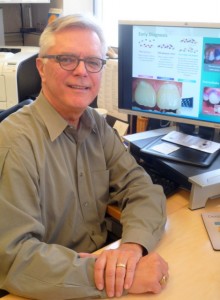Business name: DentaQuest Oral Health Center
Address: 2400 Computer Drive, Westborough
President: Robert D. Compton, DDS
Contact Information: 508-329-2250
By Nancy Brumback, Contributing Writer

What is DentaQuest?
“Our office in Westborough houses two DentaQuest organizations,” explained Dr. Robert Compton, who heads both. “DentaQuest Institute works with dental practices to improve their effectiveness and efficiency. We'se partnered with Boston Children's Hospital, for example, on a project to reduce early childhood tooth decay since 2008. We now have 35 sites across the country, including major hospitals and dental schools, learning those protocols.
“When it comes to most diseases, behavior is a significant component. Tooth decay is a self-inflicted disease, and reducing risky behavior makes a huge difference. In the Boston Children's example, we helped change the behavior of parents so that if they put the child to bed with a bottle they put water in it instead of milk. Boston Children's reduced the decay rate by 65% in the first year for high risk children.
“DentaQuest Oral Health Center is a regular dental office, but we practice differently.”
How do you practice differently?
??? “Our practice is very prevention focused,” Compton said, noting the practice was named the American Dental Association's Preventive Practice of the Year in 2010. It started in Southborough in 1999 and moved to Westborough seven years ago.
“We first do a risk assessment to identify behaviors that might be contributing to tooth decay. We encourage patients to change just one risky thing. For example, a parent may let a child sip on apple juice for long periods. Apple juice is 100 times more acidic than the environment needed to start tooth decay. By sipping all day rather than just at mealtime, the teeth are constantly exposed to an acid and that is what's harmful.
“We can detect early stage decay; we can see whether a tooth is losing calcium and phosphate (demineralization) leading to decay. We have technology that makes the tooth glow where there is demineralization, though you can's actually see it. That cavity will take a couple of years of repeated acid attacks to develop. Therefore, we can give patients a prescription-strength fluoride toothpaste that helps put the minerals back in and heal the tooth.
“If we do a filling on that tooth, it will likely have more decay around it in the future. If we heal it, the tooth is more resistant to future decay because fluoride is incorporated into the tooth. Instead of just watching a spot, we can treat it and not let decay develop.
“As people age, gums often recede and cavities start forming on root surfaces. If detected early enough, we can treat that with fluoride varnish and help remineralize those surfaces.”
Are you a full-service practice?
“Yes, with heavy focus on prevention and trying to help people stay healthy. We treat both children and adults, and offer specialties such as orthodontics and endodontics.”
?
When should a child first see a dentist?
??? “It's recommended by age 1,” he said. “We like to see a child shortly after the teeth start coming in to get the child used to seeing the dentist. We also work with parents to see if they are doing anything that might be harmful to the child's teeth.
“Ideally, we start having that conversation when a woman is pregnant, for example, explaining she can pass decay-causing bacteria from her mouth to the baby by tasting food before feeding it.”
Editor's Note: The preceding is not an endorsement and is presented for informational purposes only.















